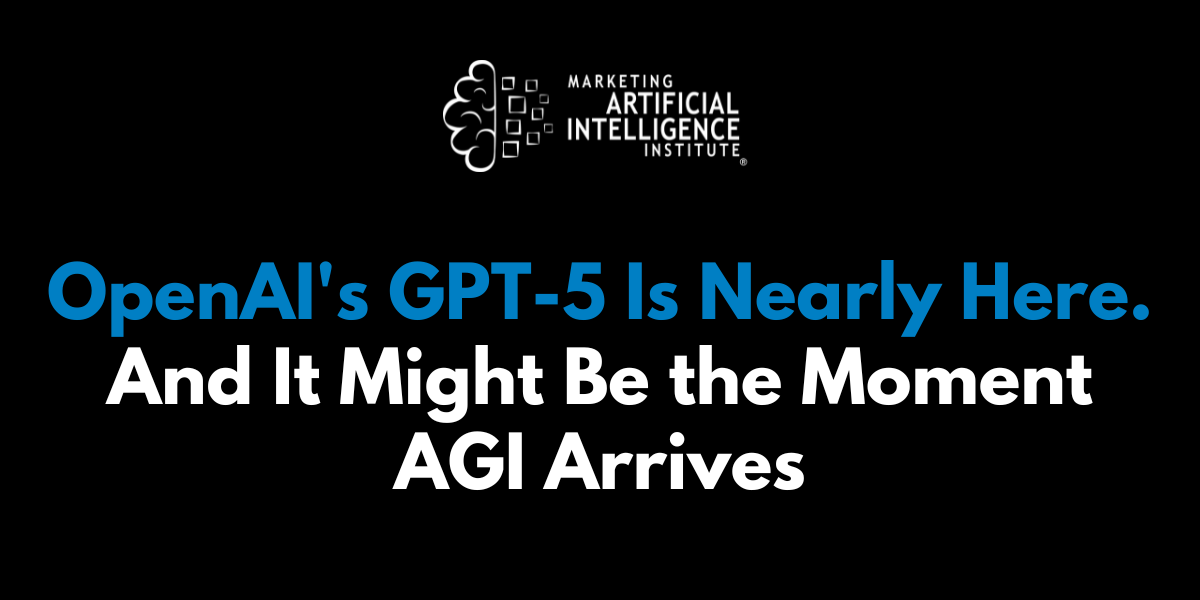OpenAI is expected to release GPT-5 as early as August, according to The Verge. And based on everything we know, it could be a game-changer not just for AI, but for how we think about intelligence itself.
That’s not just marketing hype. OpenAI CEO Sam Altman is already publicly previewing GPT-5’s capabilities, even letting it tackle questions he couldn’t answer himself.
“I put it in the model. This is GPT-5. And it answered it perfectly,” he told comedian Theo Von on a recent podcast. Altman described it as a “here it is moment,” saying he “felt useless relative to the AI.”
So what’s actually coming in August? And could this really be the system that hits artificial general intelligence—the holy grail of AI?
I broke it all down with Marketing AI Institute founder and CEO Paul Roetzer on Episode 159 of The Artificial Intelligence Show.
A Unified Model With AGI Ambitions
The Verge says GPT-5 is set to include a flagship model with integrated o3 reasoning, a lightweight "mini" version, and an API-only "nano" variant. Unlike previous generations, which separated models by function, GPT-5 is expected to consolidate reasoning, chat, and image capabilities into a single unified system, or at least route requests intelligently between them.
That might seem like a technical detail. But it could be the key to unlocking real AGI capabilities.
"My general feeling is I think we're kind of at AGI roughly," says Roetzer. "I think OpenAI probably believes GPT-5 is or will be AGI."
That might also explain why OpenAI is shifting its language from "AI" to "superintelligence" in recent communications.
Altman didn’t just stop at teasing GPT-5’s brainpower. On Theo Von's show, he called it “the smartest thing in the room," smarter, in fact, than himself.
Could an AI CEO Be Next?
If GPT-5 can outperform humans intellectually, could it eventually replace them in leadership roles? Altman entertained that exact question when asked if an AI could someday be president.
He pivoted to a more familiar job: his own. Being CEO of OpenAI, he said, might one day be better done by an AI.
Think about it: an AI that talks to every employee and customer daily. An AI that synthesizes real-time analytics, feedback, and sentiment from across the entire business—and makes better, faster decisions than any human possibly could.
"Imagine a generative AI model had access to all of that and could synthesize it into three bullet points at any given moment," says Roetzer.
A Wake-Up Call for Everyday Users
While AI insiders are already bracing for this leap, the average user might be in for a shock.
Many people still don’t know which model to use in ChatGPT, let alone how reasoning models work. GPT-5 could change that overnight by handling everything automatically—and doing it far better than most people expect.
And that might be the most profound shift of all. Because once GPT-5 quietly starts outperforming humans at everyday reasoning tasks—without users needing to even think about which model to choose, it won’t just feel like a better chatbot. It may feel like something more.
So, GPT-5 may or may not come with an AGI label. But based on Altman's remarks and the broader trajectory of OpenAI's technology, it could mark the point where AI stops being "just a tool" and starts being something much closer to a synthetic mind.
Whether or not we declare AGI this August, the implications are massive: for business, for leadership, and for humanity.
And if GPT-5 really is smarter than us in "almost every way"?
That future just got a lot closer.
Mike Kaput
Mike Kaput is the Chief Content Officer at SmarterX and a leading voice on the application of AI in business. He is the co-author of Marketing Artificial Intelligence and co-host of The Artificial Intelligence Show podcast.


